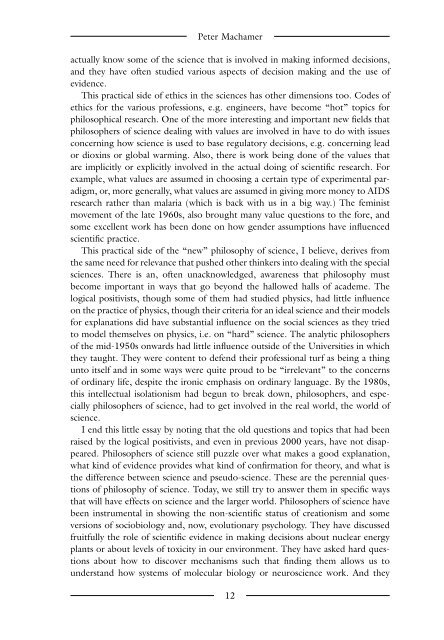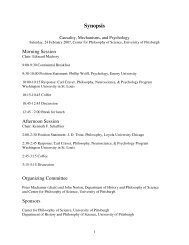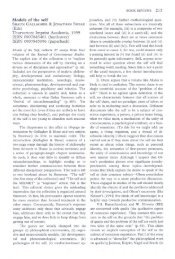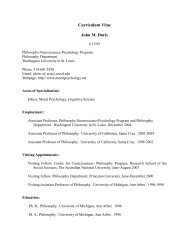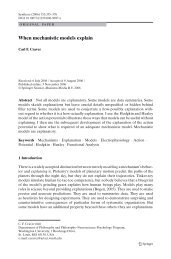The Blackwell Guide to the Philosophy of Science - The Department ...
The Blackwell Guide to the Philosophy of Science - The Department ...
The Blackwell Guide to the Philosophy of Science - The Department ...
Create successful ePaper yourself
Turn your PDF publications into a flip-book with our unique Google optimized e-Paper software.
Peter Machamer<br />
actually know some <strong>of</strong> <strong>the</strong> science that is involved in making informed decisions,<br />
and <strong>the</strong>y have <strong>of</strong>ten studied various aspects <strong>of</strong> decision making and <strong>the</strong> use <strong>of</strong><br />
evidence.<br />
This practical side <strong>of</strong> ethics in <strong>the</strong> sciences has o<strong>the</strong>r dimensions <strong>to</strong>o. Codes <strong>of</strong><br />
ethics for <strong>the</strong> various pr<strong>of</strong>essions, e.g. engineers, have become “hot” <strong>to</strong>pics for<br />
philosophical research. One <strong>of</strong> <strong>the</strong> more interesting and important new fields that<br />
philosophers <strong>of</strong> science dealing with values are involved in have <strong>to</strong> do with issues<br />
concerning how science is used <strong>to</strong> base regula<strong>to</strong>ry decisions, e.g. concerning lead<br />
or dioxins or global warming. Also, <strong>the</strong>re is work being done <strong>of</strong> <strong>the</strong> values that<br />
are implicitly or explicitly involved in <strong>the</strong> actual doing <strong>of</strong> scientific research. For<br />
example, what values are assumed in choosing a certain type <strong>of</strong> experimental paradigm,<br />
or, more generally, what values are assumed in giving more money <strong>to</strong> AIDS<br />
research ra<strong>the</strong>r than malaria (which is back with us in a big way.) <strong>The</strong> feminist<br />
movement <strong>of</strong> <strong>the</strong> late 1960s, also brought many value questions <strong>to</strong> <strong>the</strong> fore, and<br />
some excellent work has been done on how gender assumptions have influenced<br />
scientific practice.<br />
This practical side <strong>of</strong> <strong>the</strong> “new” philosophy <strong>of</strong> science, I believe, derives from<br />
<strong>the</strong> same need for relevance that pushed o<strong>the</strong>r thinkers in<strong>to</strong> dealing with <strong>the</strong> special<br />
sciences. <strong>The</strong>re is an, <strong>of</strong>ten unacknowledged, awareness that philosophy must<br />
become important in ways that go beyond <strong>the</strong> hallowed halls <strong>of</strong> academe. <strong>The</strong><br />
logical positivists, though some <strong>of</strong> <strong>the</strong>m had studied physics, had little influence<br />
on <strong>the</strong> practice <strong>of</strong> physics, though <strong>the</strong>ir criteria for an ideal science and <strong>the</strong>ir models<br />
for explanations did have substantial influence on <strong>the</strong> social sciences as <strong>the</strong>y tried<br />
<strong>to</strong> model <strong>the</strong>mselves on physics, i.e. on “hard” science. <strong>The</strong> analytic philosophers<br />
<strong>of</strong> <strong>the</strong> mid-1950s onwards had little influence outside <strong>of</strong> <strong>the</strong> Universities in which<br />
<strong>the</strong>y taught. <strong>The</strong>y were content <strong>to</strong> defend <strong>the</strong>ir pr<strong>of</strong>essional turf as being a thing<br />
un<strong>to</strong> itself and in some ways were quite proud <strong>to</strong> be “irrelevant” <strong>to</strong> <strong>the</strong> concerns<br />
<strong>of</strong> ordinary life, despite <strong>the</strong> ironic emphasis on ordinary language. By <strong>the</strong> 1980s,<br />
this intellectual isolationism had begun <strong>to</strong> break down, philosophers, and especially<br />
philosophers <strong>of</strong> science, had <strong>to</strong> get involved in <strong>the</strong> real world, <strong>the</strong> world <strong>of</strong><br />
science.<br />
I end this little essay by noting that <strong>the</strong> old questions and <strong>to</strong>pics that had been<br />
raised by <strong>the</strong> logical positivists, and even in previous 2000 years, have not disappeared.<br />
Philosophers <strong>of</strong> science still puzzle over what makes a good explanation,<br />
what kind <strong>of</strong> evidence provides what kind <strong>of</strong> confirmation for <strong>the</strong>ory, and what is<br />
<strong>the</strong> difference between science and pseudo-science. <strong>The</strong>se are <strong>the</strong> perennial questions<br />
<strong>of</strong> philosophy <strong>of</strong> science. Today, we still try <strong>to</strong> answer <strong>the</strong>m in specific ways<br />
that will have effects on science and <strong>the</strong> larger world. Philosophers <strong>of</strong> science have<br />
been instrumental in showing <strong>the</strong> non-scientific status <strong>of</strong> creationism and some<br />
versions <strong>of</strong> sociobiology and, now, evolutionary psychology. <strong>The</strong>y have discussed<br />
fruitfully <strong>the</strong> role <strong>of</strong> scientific evidence in making decisions about nuclear energy<br />
plants or about levels <strong>of</strong> <strong>to</strong>xicity in our environment. <strong>The</strong>y have asked hard questions<br />
about how <strong>to</strong> discover mechanisms such that finding <strong>the</strong>m allows us <strong>to</strong><br />
understand how systems <strong>of</strong> molecular biology or neuroscience work. And <strong>the</strong>y<br />
12


